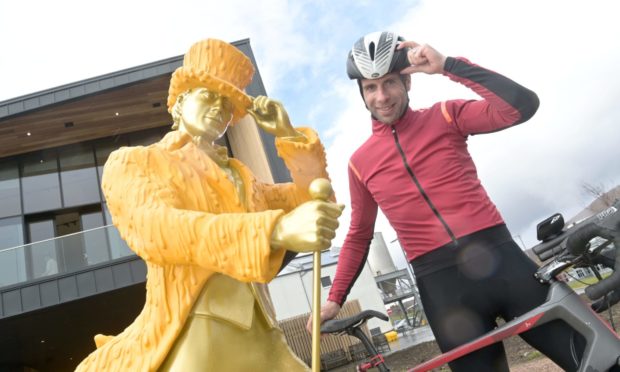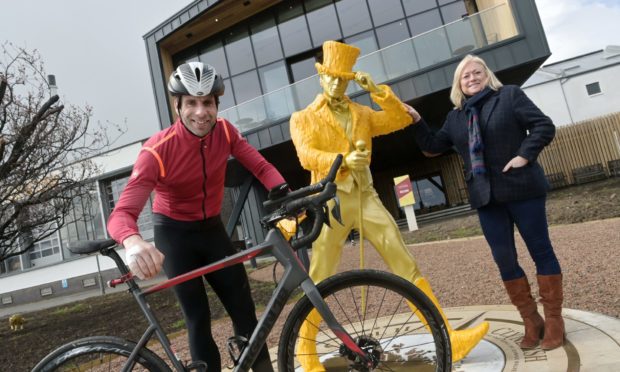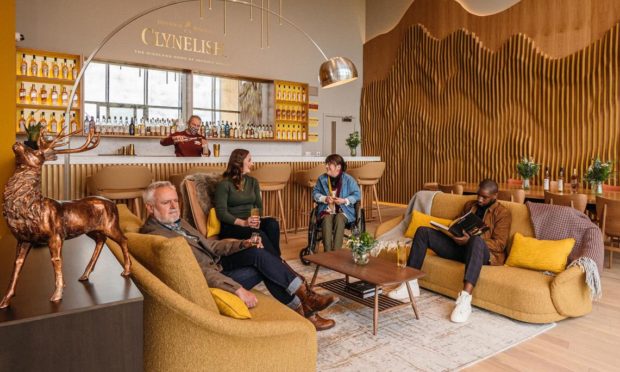The north’s tourism recovery has gained momentum with the opening of a major distillery visitor centre after a multi-million pound revamp.
The redeveloped Clynelish Distillery has opened its doors in Brora, on the North Coast 500 tourist route, as visitors make a return with the easing of lockdown.
The Highland Home of Johnnie Walker was officially opened by Scottish cycling legend and sustainable travel advocate Mark Beaumont.
The new-look centre, which was given the go-ahead in 2019, is an ‘interactive, multi-sensory experience’ with secret rooms and hidden keys, each ‘unlocking’ elements of the whisky’s story, as well as tales of the local people, landscape and culture.
The site’s renovation is part of Diageo’s wider £185 million investment in visitor facilities as it gradually re-opens ten of its 12 distilleries across Scotland in line with Covid regulations.
Mark Beaumont, known for being the fastest man to cycle around the world, is also an NC500 ambassador and welcomed Diageo’s investment in sustainable tourism on the route.
He said: “Scotch whisky is such an important part of Scotland’s tourism eco-system, along with our incredible natural environment and our beautiful highland and island communities.
“It is vital that we rebuild tourism in the right way for the environment and the community. The future has to be about high-quality visitor experiences that are thoughtful about their local environment, and it is great to see that exemplified with the new Highland Home of Johnnie Walker at Clynelish Distillery.”
New centre is more accessible
Clynelish is the latest Diageo distillery, alongside Lagavulin, Blair Athol, Oban, Brora, Glenkinchie and Royal Lochnagar, to receive a Gold Standard Green Tourism award. It has also worked with Euan’s Guide, the disabled access charity, to make the new centre more accessible for visitors.
Barbara Smith, managing director of Scotland brand homes for Diageo, said: “We are delighted to be able to open the doors to Clynelish and celebrate the welcomed return of visitor attractions and domestic travel.
“Sustainability from grain-to-glass is at the heart of our ambition for the future. Through our tourism investment in Scotland, we are focused on creating destinations that will be sustainable in the long term, and we’re glad to have Mark here today to champion this.”
She added: “The reopening of Clynelish is very much part of a carefully planned, phased return of tourism that is respectful of local communities.
“The safety of our people, the local community and our visitors is always our first priority. There is still a long way to go before we once again welcome our international guests, but for now we are focused on our neighbours in Brora and the Highlands, and staycation visitors from around the country, who we know will love the experience we have created.”
Investment is transforming visitor centres
Clynelish was founded in 1819, a few miles from Brora by the Marquis of Stafford and cost £750 to build.
In 1967 a second distillery was opened a stone’s throw from the first. For a while they were run together, as Clynelish A and Clynelish B, before it was decided to make the distinction between the two sites. Clynelish stayed in the new premises, while the old distillery became known as Brora.
It is the second site to be transformed as part of Diageo’s £185 million investment, following the opening of Glenkinchie in October. The project will also see the upgraded Cardhu distillery reopen later this spring, as well as the new Johnnie Walker Princes Street whisky experience in Edinburgh this summer.
Clynelish is also one of the Four Corners of Scotland single malt distilleries – along with Glenkinchie (East Lothian), Cardhu (Speyside) and Caol Ila (Islay).
Each of these centres has a Johnnie Walker ‘striding man’ statue with a local twist. At Clynelish the statue has been designed by Clare Baird an illustrator, designer and graduate from Edinburgh College of Art.
A wildcat, for long the logo of the distillery, is included on every bottle.



